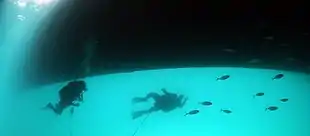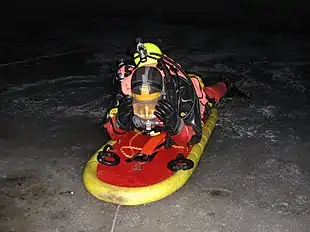Police diving
Police diving is a branch of professional diving carried out by police services. Police divers are usually sworn police officers, and may either be employed full-time as divers or as general water police officers, or be volunteers who usually serve in other units but are called in if their diving services are required.
.jpg.webp)
The duties carried out by police divers include rescue diving for underwater casualties and search and recovery diving for evidence and bodies.[1]
"Public safety diving" is a term coined by Steven J Linton in the 1970s to describe underwater rescue, underwater recovery and underwater investigation conducted by divers working for or under the authority of municipal, state or federal agencies. These divers are typically members of police departments, sheriff's offices, fire rescue agencies, search and rescue teams or providers of emergency medical services. Public Safety Divers (PSDs) can be paid by the previously mentioned agencies or be non-paid volunteers.
Public safety diving

An extract from NYPD Scuba Team on what public safety diving includes:[2]
- Evidence recovery
- Submerged body recoveries (from accidents/suicides/crime victims)
- Anti-narcotics operations (inspecting ships hulls etc.)
- Anti-terrorism operations (Explosive Ordnance Disposal)
- Search and rescue operations
- Other maritime law enforcement
Due to the conditions in which accidents may happen, or where criminals may choose to dispose of evidence or their victims, police divers might need to dive:[3]
- In murky canals, lakes, and rivers
- Currents that can run as fast as 6 knots
- In intake pipes and sewers
- In water towers
under hostile environmental conditions which can include:[3]
- Sludge, mud, debris or thick vegetation
- Under ice
- At night time or with zero visibility
- Frigid water, rough seas and weather
- Strong currents
- Water with toxins or parasites
Recreational rescue diver courses
Certification as a "Rescue Diver" by recreational diver training agencies covers skills in self rescue or buddy rescue under the normal diving conditions that the diver was trained in and has become familiar with through experience. It includes training in how to avoid accidents by recognizing panicked divers and equipment failures and in case of an accident, basic first aid and how to manage a scene until professional rescue and medical assistance arrive. Although these are good courses for improving one's diving skills and further progressing in diving education they are not appropriate training for a professional rescue diver.[4][5][6] Some professional training organisations expect a participant to be certified as a recreational rescue diver as a prerequisite for training as a professional rescue diver.
Professional public safety diving courses

For this purpose, diving training agencies such as Emergency Response Diving International (ERDI), the National Academy of Police Diving (NAPD), Team Lifeguard Systems, and Underwater Criminal Investigators have developed special courses to train divers on how to safely respond to situations where the hazards exceed those acceptable for recreational diving.[7][8][9][10]
UCI (Underwater Criminal Investigators) was founded in 1987 to provide professional underwater criminal investigations training to the public safety diving community.[10]
The National Academy of Police Diving (NAPD) was formed in 1988 by a group of police divers to create a national standard for police and public safety diver training and certification.[11] It has helped provide training for police officers, fire departments, military divers, and environmental investigators in the following locations: North America, Central America, Russia, Australia, and the Caribbean.
In South Africa, public safety diving and police diving falls under the Diving Regulations to the Occupational health and Safety Act, and such divers are required to be registered as commercial divers by the Department of Labour, and training is done by registered commercial diving schools.[12]
Public safety diving equipment
Companies like OMS and Zeagle, through the special requirements of public safety diving, have developed products specific for the task such as the OMS chemically resistant BCs, for diving in polluted water or HAZMAT conditions and Zeagle's SAR and 911 variation of their Ranger model BCD that have features like harness for helicopter lifts and swift-water work.[13][14]
History
In Britain, in the early years of the British Sub-Aqua Club (BSAC), police often called on BSAC branches to dive to find submerged bodies, before the police started their own diving branches.
See also
- Scuba diving – Swimming underwater breathing gas carried by the diver
- Professional diving – Underwater diving where divers are paid for their work
- Public safety diving – Underwater work done by law enforcement, rescue and search and recovery teams
References
- Stanton, Gregg (2003). "Underwater Crime Scene Investigations (UCSI), a New Paradigm". In: SF Norton (ed). 2003. Diving for Science...2003. Proceedings of the American Academy of Underwater Sciences (22nd annual Scientific Diving Symposium). Archived from the original on 27 July 2011. Retrieved 12 June 2012.
- Cocozza, Joe (2002). "NYPD SCUBA". Archived from the original on 7 February 2011. Retrieved 12 June 2012.
- Viders, Hillary. "The New York Police Department (NYPD) Scuba Team". www.wateroperations.com. Retrieved 1 September 2017.
- http://www.padi.com/scuba/padi-courses/diver-level-courses/view-all-padi-courses/rescue-diver/default.aspx
- http://www.tdisdi.com/wpsite/sdi/get-certified/Rescue-Diver-Course/
- http://www.naui.org/specialty_courses.aspx#040 Archived 2009-03-28 at the Wayback Machine
- http://www.tdisdi.com/wpsite/erdi/get-certified/erdi-course-options/
- http://napdonline.com/course-description-catalog/
- http://teamlgs.com/training-programs/
- "Home". ucidiver. Retrieved 8 November 2019.
- "NAPD: About us". National Academy of Police Diving. Retrieved 12 June 2012.
- "Diving Regulations 2009". Occupational Health and Safety Act 85 of 1993 – Regulations and Notices – Government Notice R41. Pretoria: Government Printer. Archived from the original on 4 November 2016. Retrieved 3 November 2016 – via Southern African Legal Information Institute.
- "Archived copy". Archived from the original on 2012-06-13. Retrieved 2012-06-12.CS1 maint: archived copy as title (link)
- "Archived copy". Archived from the original on 2012-06-07. Retrieved 2012-06-12.CS1 maint: archived copy as title (link)
